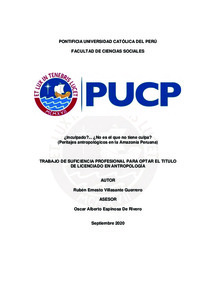| dc.contributor.advisor | Espinosa de Rivero, Oscar Alberto | |
| dc.contributor.author | Villasante Guerrero, Rubén Ernesto | |
| dc.date.accessioned | 2021-02-18T20:57:36Z | |
| dc.date.available | 2021-02-18T20:57:36Z | |
| dc.date.created | 2020 | |
| dc.date.issued | 2021-02-18 | |
| dc.identifier.uri | http://hdl.handle.net/20.500.12404/18276 | |
| dc.description.abstract | Los peritajes antropológicos o culturales constituyen actuaciones jurídicas
importantes para el debido proceso de personas que tienen una cultura diferente
a la cultura oficial y que se hallan involucradas en procesos judiciales. En este
caso se trata de pueblos indígenas de la Amazonía. Es un trabajo especializado
realizado por un experto que evalúa la pertenencia y prácticas culturales nativas
de la persona imputada. Está amparada en el artículo 15 del Código Penal que
establece eximir o atenuar la pena, si el hecho punible fue cometido por un error
culturalmente condicionado.
El presente informe profesional contiene cinco pericias realizadas como
parte de las acciones promovidas por la Oficina Defensorial de Loreto de la
Defensoría del Pueblo para superar la vulnerabilidad jurídica en que se hallan
las poblaciones indígenas. Cuatro casos evaluados fueron delitos contra el
cuerpo y la salud (violación de menor, uno de ellos con el agravante de incesto)
y un caso de homicidio simple. En todos los casos se determinó la pertenencia
a comunidades nativas (dos kukama, dos kichuas del Alto Napo y un kandozi) y
el haber sido formados con las pautas culturales nativas correspondientes. Los
dictámenes están redactados en forma de relatos, con un lenguaje asequible,
orientados a ilustrar a los jueces sobre las pautas culturales que configuran el
comportamiento de los nativos involucrados. En todos los casos las sentencias
emitidas redujeron considerablemente las penas solicitadas por la Fiscalía para
los delitos imputados (por ejemplo, de veinticinco años solicitado por el fiscal a
cinco años), excepto en el caso de incesto. | es_ES |
| dc.description.abstract | Cultural or anthropological expertise constitute important legal actions for
the due process of people who have a different culture from the official culture
and who are involved in legal processes. In this case it has been from indigenous
people of the Amazon territory. It is a specialized work carried out by an expert
who evaluate the belonging and native cultural practices of the imputed person.
It is protected in article 15 of the Penal Code that establishes exemption or
mitigation of the penalty, if the punishable act was committed by a culturally
conditioned error.
This professional report contains five expertise carried out as part of the
actions promoted by the Ombudsman's Loreto Office to overcome the legal
vulnerability of indigenous populations. Four cases evaluated were crimes
against the body and health (rape of a minor, one of them with the aggravation of
incest) and one case of simple homicide. In all cases were determined the
belonging to native communities (two kukama, two kichuas from the Alto Napo
and one kandozi) and has been formed with the corresponding native cultural
guidelines. The dictums are written in the form of stories, with accessible
language, aimed at illustrating the judges on the cultural guidelines that guide the
behavior of the natives involved. In all cases, the sentences issued considerably
reduced the penalties requested by the prosecution for the crimes attributed (for
example, from twenty-five years requested by the prosecutor to five years),
except in the case of incest. | es_ES |
| dc.language.iso | spa | es_ES |
| dc.publisher | Pontificia Universidad Católica del Perú | es_ES |
| dc.rights | info:eu-repo/semantics/openAccess | es_ES |
| dc.rights.uri | http://creativecommons.org/licenses/by-nc-nd/2.5/pe/ | * |
| dc.subject | Pueblos indígenas--Perú--Amazonia, Región--Aspectos jurídicos | es_ES |
| dc.subject | Comunidades nativas--Perú--Amazonia, Región--Aspectos jurídicos | es_ES |
| dc.subject | Administración de justicia--Perú--Amazonia, Región--Aspectos culturales | es_ES |
| dc.title | ¿Inculpado?... ¿No es el que no tiene culpa? (Peritajes antropológicos en la Amazonía Peruana) | es_ES |
| dc.type | info:eu-repo/semantics/bachelorThesis | es_ES |
| thesis.degree.name | Licenciado en Antropología | es_ES |
| thesis.degree.level | Título Profesional | es_ES |
| thesis.degree.grantor | Pontificia Universidad Catolica del Peru. Facultad de Ciencias Sociales | es_ES |
| thesis.degree.discipline | Antropología | es_ES |
| renati.advisor.dni | 06104457 | |
| renati.advisor.orcid | https://orcid.org/0000-0001-6605-013X | es_ES |
| renati.author.dni | 07413470 | |
| renati.discipline | 222016 | es_ES |
| renati.juror | Diez Hurtado, Antonio Alejandro | |
| renati.juror | Salas Carreño, Guillermo | |
| renati.juror | Espinosa De Rivero, Oscar Alberto | |
| renati.level | https://purl.org/pe-repo/renati/level#tituloProfesional | es_ES |
| renati.type | http://purl.org/pe-repo/renati/type#trabajoDeSuficienciaProfesional | es_ES |
| dc.publisher.country | PE | es_ES |
| dc.subject.ocde | http://purl.org/pe-repo/ocde/ford#5.04.03 | es_ES |






